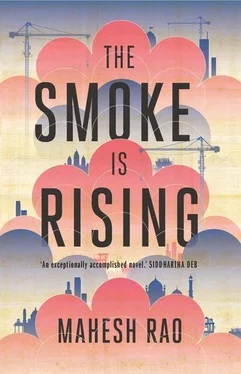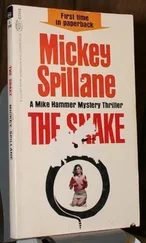Gayathri was wringing out the sheets, cheerfully throttling the coils with her strong arms and then unwinding them to hang out to dry. It looked like she had nearly finished. Girish was still in the bathroom. Mala dared not think she had already succeeded but it was beginning to look like it was possible. She did not want to walk to the washing area to talk to Gayathri: the sounds of Girish coming out of the bathroom would not reach her there. She thought that at best she only had a few more minutes.
There were about thirty hours left before they were due to catch the bus that would take them to the airport. A few hours later, they would be on a direct flight to Colombo. Before boarding, they would browse the duty-free shops and have a coffee at one of the cafés. On the plane, Girish might fall asleep, his head nudging Mala’s shoulder. He would probably engage the cabin crew in conversation. Mala would smile. They would land and then clear immigration. There would be urgent tasks, looking out for bags, changing money, checking vouchers. Girish would probe, explain and hurry. Or he would be silent and casual. They would be in Colombo at the start of two weeks of exoticism, the threat of tectonic displacement vibrating under her feet.
She began to count the lies she had told to get her to this point. She had lied to Girish about booking her leave, paying all the bills before they left and setting aside the clothes she was packing. She had lied to her parents about when they were returning. She had lied to Ambika about the reason for the trip, a supposed promotion for Girish at work. She had lied to Lavanya and Anand about her excitement, trilling over the sights in store. She had lied to Mr Tanveer and Shiiprraa, not even having mentioned the trip. There was only so much enumeration that she could undertake before her predicament broke over her head like a breached dam. Her eyelids felt like massive weights had been placed on them. She went to the kitchen sink, splashed some water over her face and wiped it off with her hands.
Gayathri walked into the kitchen, tucking a stray pleat in under her stomach.
Mala said: ‘Come with me one second.’
She led her into the sitting room. The bathroom door was still closed.
‘You remember, we will not be here for two weeks from tomorrow?’ she asked, turning to Gayathri.
‘From tomorrow, is it? I knew but good thing you reminded me. My brain is turning into batter.’
In the background there was a shift in the sounds coming from the old man’s radio. Perhaps he had switched stations.
‘Here, hold out your hand,’ said Mala.
Gayathri looked at her suspiciously.
‘Why?’
‘Just do it.’
Gayathri pushed her hand out and then, with a chuckle, shut her eyes too.
When she felt the cold weight on her palm, she opened her eyes and took a step back.
A gold chain lay coiled in hard mounds in her hand.
‘What is this for?’
‘It’s for you.’
‘For me? But why?’
‘Please, just take it.’
‘I can’t take something so expensive for no reason.’
Gayathri stretched out her hand to give the chain back to Mala.
It was Mala’s turn to take a step back.
‘It’s for you. So just take it.’
‘No no, I can’t do that.’
‘You should never tell Lakshmi to go away. She may never return.’
‘But I don’t understand.’
‘You will.’
Gayathri looked at Mala for a few seconds and then at the chain in her hand. Nodding, she tucked it deep into her blouse. She picked up a plastic bag that she had left on the table.
‘God bless you,’ she said softly.
Mala managed a smile.
At the door, without turning around, Gayathri said loudly: ‘So in two weeks is it then?’
Mala nodded: ‘Yes, see you in two weeks.’
The door shut, the gate bolt screeched across the paving stone in the yard and then Gayathri was gone.

What happened could probably be blamed on the uncurling of a tiny fist. It was that single movement that wrenched Shankar’s heart out of place and set in motion a perfectly avoidable set of events. He had seen his infant son reach out hundreds of times before, pummelling the air and then pulling at invisible filaments in total absorption. A familiar dimple formed in the side of his fist and then creased into a fat fold of baby flesh. The outstretching of a helpless arm was nothing new. But this time, as his son slowly unfurled his fingers, Shankar felt the knowledge of his infidelity smash down on his chest.
Staring at the coloured rings that hung over his son’s crib, he spoke.
Janaki’s interrogation was forensic and emotionless. She desired as much detail as Shankar could be compelled to provide. She tried to pin occasions down to the nearest day; she followed up on instances, durations and locations; she demanded full descriptions, always repeating the same question in a voice like a thick blade until Shankar provided a response. She compiled the grim catalogue as if she had developed an addiction to that hot stab of revelation. At one point when the baby started to cry, she coddled him in the folds of her sari and, mechanically rocking his head against her knee, continued the questioning. Her need was avid and she scythed through Shankar’s shame till she had gathered up every last kernel of information. Then she put the baby back in his crib and left the room, shutting herself in the bedroom for an hour or so.
Shankar sat at the table, glancing occasionally at the bedroom door but not daring to look at his sleeping son. Apart from the scales of traffic, rising and falling beyond the open windows, the afternoon was imbued with stillness, like grief, like death. The long period of questioning seemed to have removed all the oxygen from the air. Breathing now involved only stolen gasps of waste vapour, thin and foul.
When Janaki emerged from the bedroom, she picked up the baby’s kit bag and methodically began to fill it: nappies, bottles, clothes, formula, a blanket, squeaky toys and a rattle. She checked the contents of her handbag. Briefly she stepped back into the bedroom and then returned, holding her phone charger and a purse. She picked up her own keys from the hook on the wall and also the keys to her mother’s house. Then, lifting the baby out of his crib, she settled his head into the soft dale of her neck. She picked up the bags with her free hand and let herself out of the house.
Shankar watched her movements like a condemned man replaying in his head the pronouncement of his judgment. When she had gone, he put his forehead down on the table, the plastic surface sticky against his skin. He had imagined this scene many times over the last few weeks. The surprising thing was that her departure had unfolded exactly as he had visualised it, no better, no worse. He was left with the stinging thought that no matter how badly he had misjudged himself, he had judged Janaki perfectly.

The lane outside the house had not woken from its afternoon slumber. It had been hours since the last vegetable vendor had rolled past, the shutters of the provision store on the corner were down and the toddlers at home were probably still napping. But clearly not everything was asleep. The smell of fresh dung rose into the air like a blast of scorched raisins.
Mala closed the gate behind her, lips pursed, placing the latch back on its rest with precision. She walked as quickly as she could to the end of the lane, looking straight ahead, trying to ignore the way the strap of the bag was cutting into her shoulder. There were no rickshaws at the corner. She would have to walk to the main road. Or she could wait here for a few minutes. On any other day perhaps, but not like this, not today with her bags.
Читать дальше













